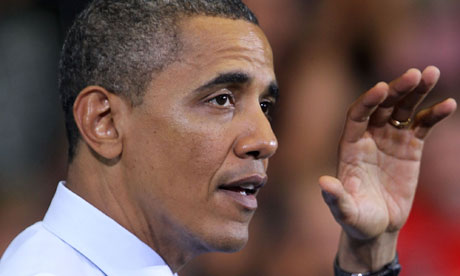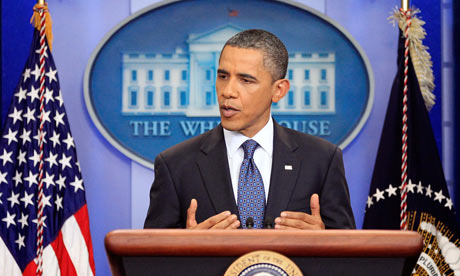BAK
JF-Expert Member
- Feb 11, 2007
- 124,789
- 288,015
WASHINGTON As efforts to avoid an unprecedented U.S. default entered crunch time Friday, President Obama faced growing tensions with senior congressional Democrats, who are angry at White House concessions to Republicans and at being left out of the talks.
Friday is essentially the start of crunch time. The White House initially set a July 22 target for a deal that would leave enough time to get it through the legislative process. But it has backed off that timeframe in recent days with both sides still far apart on the issues.
If Congress fails to raise the debt ceiling in time, the United States would default on its obligations, possibly plunging the country back into recession and sparking a crisis in financial markets worldwide.
Story: Debt ceiling uncertainty puts states at risk The main obstacle remained the issue of tax increases that Obama's Democrats demand and Republicans vehemently oppose.
There were conflicting accounts of how and when higher revenue might kick in, and the White House vowed there would be no deal without this.
Negotiations have seesawed between competing and even conflicting options, and leaders on both sides face resistance within their own ranks to some ideas now gaining traction.
But alarm was expressed most loudly Thursday by Democrats, who have complained about what they see as Obama's willingness to make concessions on social spending cuts. Democrats will also be unhappy if the president agrees to no immediate tax increases.
'Heated' party lunch
Privately, top Democrats expressed their frustrations at White House budget director Jacob J. Lew during a "heated" party lunch, The New York Times reported.
According to The Washington Post, Sens. John F. Kerry (Mass.), Barbara A. Mikulski (Md.), Maria Cantwell (Wash.) and others demanded that Lew explain what the president was doing in his talks with Boehner.
Following the tense 45-minute meeting, Mikulski turned to her colleagues and said, "I havent seen a meeting like this in my 35 years in Congress," the Post reported.
"The president always talked about balance: There had to be some fairness in this, this cant be all cuts," The New York Times quoted Sen. Harry Reid, the Senate majority leader, as saying as he left the meeting with Lew. "The caucus agrees with that. I hope the president agrees with that, and Im confident he will."
Video: Ryan: No one wants to see the US default (on this page)The budget talks dispute has brought long-simmering tensions between the White House and Capitol Hill Democrats to the surface.
It would concern me greatly if these folks the Tea Party group have been able to convince the president to go along with a deal that basically gives them everything they want but yet still takes away from those who are our most vulnerable," Rep. Elijah E. Cummings (Md.), a former chairman of the Congressional Black Caucus, told The Washington Post.
Awaiting health care details from 'Gang of Six'"The people that Im talking about, when youre talking about Medicaid, Medicare and Social Security and Im sure they're all mixed up in there in this $3 trillion those are people, a lot of whom are in my district, who have no alternatives," he told the Post. "Theyre not the guys who own the planes; theyre not the ones who fly off to Paris for vacation."
The focus is on what congressional sources say is shaping up as a wide-ranging package of deficit cuts over 10 years, something many in Washington hope will help save America's triple-A credit rating.
Rating agencies have threatened a U.S. bond downgrade without a comprehensive deficit-cutting deal.
But confusion has grown amid a patchwork of proposals aimed at finding what a senior Democratic aide called the "magic formula" for resolving the crisis, which has dominated Washington's agenda for weeks.
"Frankly, we've looked at a half a dozen fallback plans, none of which are all that appetizing," Boehner struggling with Tea Party lawmakers largely opposed to any compromise with Obama told conservative talk-show host Rush Limbaugh.
General fears defense cuts
Meanwhile, Obama's nominee for Army chief of staff, Gen. Raymond Odierno, cautioned lawmakers Thursday against slashing defense spending too deeply.
Odierno told members of the Senate Armed Services Committee that the United States has a history of shrinking its military too quickly after conflicts, only to have to rebuild later.
"We must avoid our historical pattern of drawing down too fast and getting too small," said Odierno, former commander of U.S. forces in Iraq. "As we make difficult resource decisions, we must be thoughtful in understanding the risk we incur to our nation's future security."
Committee members expressed anxiety over the coming cutbacks, but generally agreed there was no avoiding them.
"We're the Armed Services Committee, so I suppose we understandably feel a special protectiveness of the military budget," Sen. Joseph Lieberman, I-Conn. told Odierno and other nominees for key military posts. But he added, "Everybody has to give in this crisis."
Republican Sen. Tom Coburn (Okla.) unveiled a deficit reduction plan earlier this week that included $1 trillion in defense cuts, much of it through changes to the military's healthcare system, reducing the nuclear weapons force structure and canceling or delaying arms programs.
Another package of proposed cuts, by the so-called Gang of Six senators, came under fire from the chairman of the House Armed Services Committee, Buck McKeon. The California Republican warned that it included $886 billion in national security cuts and said he opposed it.
Despite the gulf between the two sides, reports that negotiators were starting to
close in a debt deal helped fuel a rally in U.S. and world stocks on Thursday.
"There will be plenty of haggling over the details of all these plans in the days ahead," Obama said in an appeal for compromise in a USA Today opinion piece. "But right now, we have the opportunity to do something big and meaningful."
But crucial to the success of any deal will be Obama's ability to retain the loyalty of his own party.
Asked by The Washington Post on Thursday whether she felt the White House was "working off the same page" as her, Sen. Dianne Feinstein, D-Calif., responded simply: "No."
- Other political news of note
- Four thoughts on the debt-ceiling fight First Read: Here are a few thoughts on our government and politics as we head into the end game on debt talks.
- Updated 7 minutes ago 7/22/2011 11:56:45 AM +00:00 Obama faces angry Dems as debt talks hit crunch
- NYT: Debt ceiling uncertainty puts states at risk
- First Read: Huntsman campaign manager quits
- Reid calls House 'untoward' for taking weekend off
Friday is essentially the start of crunch time. The White House initially set a July 22 target for a deal that would leave enough time to get it through the legislative process. But it has backed off that timeframe in recent days with both sides still far apart on the issues.
If Congress fails to raise the debt ceiling in time, the United States would default on its obligations, possibly plunging the country back into recession and sparking a crisis in financial markets worldwide.
Story: Debt ceiling uncertainty puts states at risk The main obstacle remained the issue of tax increases that Obama's Democrats demand and Republicans vehemently oppose.
There were conflicting accounts of how and when higher revenue might kick in, and the White House vowed there would be no deal without this.
Negotiations have seesawed between competing and even conflicting options, and leaders on both sides face resistance within their own ranks to some ideas now gaining traction.
But alarm was expressed most loudly Thursday by Democrats, who have complained about what they see as Obama's willingness to make concessions on social spending cuts. Democrats will also be unhappy if the president agrees to no immediate tax increases.
'Heated' party lunch
Privately, top Democrats expressed their frustrations at White House budget director Jacob J. Lew during a "heated" party lunch, The New York Times reported.
According to The Washington Post, Sens. John F. Kerry (Mass.), Barbara A. Mikulski (Md.), Maria Cantwell (Wash.) and others demanded that Lew explain what the president was doing in his talks with Boehner.
Following the tense 45-minute meeting, Mikulski turned to her colleagues and said, "I havent seen a meeting like this in my 35 years in Congress," the Post reported.
"The president always talked about balance: There had to be some fairness in this, this cant be all cuts," The New York Times quoted Sen. Harry Reid, the Senate majority leader, as saying as he left the meeting with Lew. "The caucus agrees with that. I hope the president agrees with that, and Im confident he will."
Video: Ryan: No one wants to see the US default (on this page)The budget talks dispute has brought long-simmering tensions between the White House and Capitol Hill Democrats to the surface.
It would concern me greatly if these folks the Tea Party group have been able to convince the president to go along with a deal that basically gives them everything they want but yet still takes away from those who are our most vulnerable," Rep. Elijah E. Cummings (Md.), a former chairman of the Congressional Black Caucus, told The Washington Post.
Awaiting health care details from 'Gang of Six'"The people that Im talking about, when youre talking about Medicaid, Medicare and Social Security and Im sure they're all mixed up in there in this $3 trillion those are people, a lot of whom are in my district, who have no alternatives," he told the Post. "Theyre not the guys who own the planes; theyre not the ones who fly off to Paris for vacation."
The focus is on what congressional sources say is shaping up as a wide-ranging package of deficit cuts over 10 years, something many in Washington hope will help save America's triple-A credit rating.
Rating agencies have threatened a U.S. bond downgrade without a comprehensive deficit-cutting deal.
But confusion has grown amid a patchwork of proposals aimed at finding what a senior Democratic aide called the "magic formula" for resolving the crisis, which has dominated Washington's agenda for weeks.
"Frankly, we've looked at a half a dozen fallback plans, none of which are all that appetizing," Boehner struggling with Tea Party lawmakers largely opposed to any compromise with Obama told conservative talk-show host Rush Limbaugh.
General fears defense cuts
Meanwhile, Obama's nominee for Army chief of staff, Gen. Raymond Odierno, cautioned lawmakers Thursday against slashing defense spending too deeply.
Odierno told members of the Senate Armed Services Committee that the United States has a history of shrinking its military too quickly after conflicts, only to have to rebuild later.
"We must avoid our historical pattern of drawing down too fast and getting too small," said Odierno, former commander of U.S. forces in Iraq. "As we make difficult resource decisions, we must be thoughtful in understanding the risk we incur to our nation's future security."
Committee members expressed anxiety over the coming cutbacks, but generally agreed there was no avoiding them.
"We're the Armed Services Committee, so I suppose we understandably feel a special protectiveness of the military budget," Sen. Joseph Lieberman, I-Conn. told Odierno and other nominees for key military posts. But he added, "Everybody has to give in this crisis."
Republican Sen. Tom Coburn (Okla.) unveiled a deficit reduction plan earlier this week that included $1 trillion in defense cuts, much of it through changes to the military's healthcare system, reducing the nuclear weapons force structure and canceling or delaying arms programs.
Another package of proposed cuts, by the so-called Gang of Six senators, came under fire from the chairman of the House Armed Services Committee, Buck McKeon. The California Republican warned that it included $886 billion in national security cuts and said he opposed it.
Despite the gulf between the two sides, reports that negotiators were starting to
close in a debt deal helped fuel a rally in U.S. and world stocks on Thursday.
"There will be plenty of haggling over the details of all these plans in the days ahead," Obama said in an appeal for compromise in a USA Today opinion piece. "But right now, we have the opportunity to do something big and meaningful."
But crucial to the success of any deal will be Obama's ability to retain the loyalty of his own party.
Asked by The Washington Post on Thursday whether she felt the White House was "working off the same page" as her, Sen. Dianne Feinstein, D-Calif., responded simply: "No."




